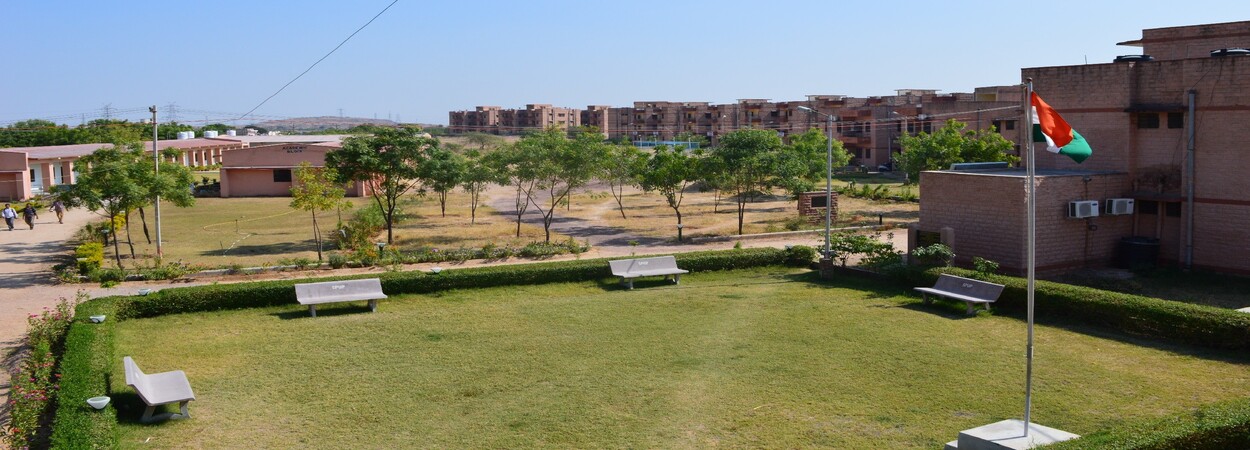Introduction about Ph.D. From Sardar Patel University of Police, Security & Criminal Justice
Sardar Patel University of Police, Security & Criminal Justice, located in Rajasthan, stands as a unique institution dedicated to advancing knowledge, research, and professional excellence in the domains of police studies, security, and criminal justice. Pursuing a Ph.D. at this University offers scholars the opportunity to engage in in-depth research on contemporary issues such as cybercrime, counter-terrorism, forensic science, and policing strategies, all under the mentorship of experienced academicians and seasoned professionals from various law enforcement agencies. The Ph.D. program is carefully structured to encourage interdisciplinary collaboration, blending theoretical frameworks from criminology, psychology, cybersecurity, law, and social sciences. By fostering partnerships with governmental organizations, think tanks, and international security bodies, the University aims to produce future leaders capable of tackling global security and justice challenges. From studying community policing initiatives to analyzing digital evidence management systems, doctoral candidates here delve into topics that have both practical and policy-oriented impacts. Through this rigorous academic journey, Ph.D. scholars hone critical thinking, analytical, and investigative skills. The University places strong emphasis on ethics, human rights, and restorative justice, ensuring that graduates not only excel in their respective fields but also uphold the highest standards of public service and responsibility. Furthermore, the campus environment is conducive to scholarly exchange, offering seminars, workshops, and conferences that encourage debate, innovation, and the sharing of best practices. Whether your aspiration is to drive policy reforms, contribute to cutting-edge research in criminology, or develop technological tools for modern policing, the Ph.D. program at Sardar Patel University of Police, Security & Criminal Justice can help transform your academic objectives into tangible career milestones. The synthesis of academic rigor, professional networking, and real-world relevance makes this institution a standout choice for those committed to shaping the future of policing, security, and criminal justice on both national and international stages.
Fee Structure for Ph.D. in Sardar Patel University of Police, Security & Criminal Justice
| Particulars | Tuition Fee Per Year (Approx.) | Registration Fee (One-Time) | Total Fee (Approx.) |
|---|---|---|---|
| Ph.D. Program | INR 60,000 | INR 10,000 | INR 1,90,000 |
Admission Process For Ph.D. in Sardar Patel University of Police, Security & Criminal Justice
The admission process for pursuing a Ph.D. at Sardar Patel University of Police, Security & Criminal Justice is carefully designed to identify candidates who exhibit a strong research aptitude, academic merit, and a passion for transforming the fields of policing, security, and criminal justice. Below is a concise overview of the key steps:
- Check Eligibility: Verify if you have a relevant Master’s degree (in criminology, psychology, law, policing, cyber security, social sciences, or related fields) with the minimum required marks or CGPA.
- Fill Application Form: Obtain the official application form from the University website or admissions office and submit it along with the application fee.
- Entrance Examination: Appear for the University’s Ph.D. Entrance Test (unless exempted by holding qualifications like UGC-NET or JRF). This test evaluates your research aptitude and subject knowledge.
- Interview/Presentation: Shortlisted candidates may be asked to present a preliminary research proposal or attend a personal interview with the doctoral committee.
- Final Selection: Based on your performance in the entrance test and interview, you will receive an offer of admission. Pay the initial fee to confirm your seat and proceed with formal registration.
Ph.D. Subjects in Sardar Patel University of Police, Security & Criminal Justice
| Subject/Discipline | Possible Research Areas |
|---|---|
| Police Administration | Community Policing, Police Reforms, Leadership & Management in Policing |
| Criminology & Criminal Justice | Juvenile Justice, Correctional Administration, Crime Theories |
| Forensic Science | DNA Analysis, Ballistics, Digital Forensics, Toxicology |
| Cyber Security | Cyber Crime Investigations, Data Privacy, Cyber Laws, Ethical Hacking |
| Law & Human Rights | Legal Frameworks, Human Rights Advocacy, Penal Code Reforms |
| Security Management | Counter-Terrorism, National Security Policies, Border Management |
| Sociology & Psychology | Victimology, Rehabilitation, Criminal Behavior Studies, Stress Management |
Document Required For Ph.D. in Sardar Patel University of Police, Security & Criminal Justice
Applicants must compile specific documents to verify their academic credentials, identity, and research interests for the University’s records and evaluation. Having these documents ready will expedite the admission process and ensure a smooth application experience. Below is a general list of the required documents:
- Completed and signed Ph.D. application form.
- Copies of academic transcripts for 10th, 12th, Graduation, and Post-Graduation.
- Migration/Transfer Certificate from the last institution attended.
- Provisional Certificate or Degree Certificate of Master’s program.
- Research proposal or Statement of Purpose (if specifically required).
- Valid identity proof (Aadhaar Card, Passport, Driving License, or similar).
- Four passport-sized recent photographs.
- Experience Certificate (if applicable, especially for employed candidates).
- Category/Reservation Certificate (if claiming under reserved categories).
- Any additional document(s) mentioned in the admission notification.
Sardar Patel University of Police, Security & Criminal Justice Ph.D. Syllabus
| Semester/Stage | Key Coursework/Components |
|---|---|
| Semester 1 | Research Methodology | Advanced Theoretical Foundations in Policing & Security | Literature Review Techniques |
| Semester 2 | Electives (Cybersecurity, Criminology, Forensics, etc.) | Statistical & Qualitative Data Analysis |
| Semester 3 | Research Proposal Submission & Defense | Advanced Seminars on Criminal Justice Reforms |
| Semester 4 & 5 | Ongoing Research Work | Field/Lab Investigations (Forensic, Policing Field Studies) | Publication & Conference Participation |
| Semester 6 & Beyond | Thesis Writing & Final Evaluation | Viva-Voce | Dissemination of Findings |
Sardar Patel University of Police, Security & Criminal Justice Research Methodology
- Conceptualizing the Research Problem: Identifying gaps in current security, policing, or criminal justice practices.
- Literature Survey: Conducting extensive reviews of policy documents, legal statutes, criminological theories, and empirical studies.
- Research Design: Choosing appropriate methodologies—qualitative, quantitative, or mixed methods—to examine crime trends, policy outcomes, and human behavior.
- Data Collection Techniques: Employing interviews, surveys, case studies, forensic tests, and digital data analysis as per the research domain.
- Data Analysis & Interpretation: Using statistical software or specialized forensic tools to interpret findings rigorously.
- Ethical Considerations: Upholding privacy, consent, and the highest ethical standards, particularly in sensitive or confidential research areas.
- Peer Reviews & Validation: Seeking feedback from academic advisors, law enforcement experts, or peer-reviewed journals.
- Final Report & Defense: Structuring the thesis coherently, culminating in a formal defense to validate the significance and reliability of the study.
Sardar Patel University of Police, Security & Criminal Justice Highlights
| Feature | Details |
|---|---|
| Location | Jodhpur, Rajasthan |
| Established | 2012 |
| Recognitions | UGC Approved, State Government Recognized |
| Academic Focus | Police Administration, Security Management, Criminal Justice, Cybersecurity, Forensic Science |
| Infrastructure | Modern Classrooms, Forensic Labs, Cybersecurity Labs, Library |
| Collaborations | MoUs with Police Departments, National & International Institutions |
| Faculty | Experienced Professors, Serving/Retired Police Officers, Legal Experts |
| Programs Offered | Undergraduate, Postgraduate, Ph.D., Specialized Diplomas & Certificate Courses |
| Student Services | Workshops, Seminars, Placement Assistance, Research Grants |
| Campus Life | Guest Lectures, Interactive Sessions with Law Enforcement & Security Agencies |
How To Apply For Ph.D. in Sardar Patel University of Police, Security & Criminal Justice
- Visit Official Website: Begin by accessing the University’s official portal to find the Ph.D. admission notification and related updates.
- Application Form: Download or fill out the online Ph.D. application form. Provide accurate personal details, academic credentials, and contact information.
- Pay Application Fee: Pay the specified application fee through debit card, credit card, net banking, or a demand draft as stated in the notification.
- Attach Required Documents: Scan and upload (or attach, if offline) all necessary academic transcripts, certificates, and identity proofs.
- Research Proposal (Optional/If Required): Draft a concise proposal outlining the research problem, aims, methodology, and expected outcomes. Submit if requested by the department.
- Entrance Test Admit Card: Keep an eye on application deadlines and download your admit card once released. Verify the test date, venue, and other instructions.
- Entrance Examination: Appear for the Ph.D. entrance test (if mandated). Be prepared for questions on research methods, subject knowledge, and current industry challenges.
- Interview/Discussion Round: Shortlisted candidates may receive an interview call or be required to defend their research proposal before a panel.
- Seat Allotment & Fee Payment: Successful candidates will be issued an offer of admission. Pay the requisite fee within the stipulated timeline to confirm enrollment.
- Registration & Orientation: Complete registration formalities, attend any orientation sessions, and begin your doctoral journey.
Courses After Ph.D. in Sardar Patel University of Police, Security & Criminal Justice
- Post-Doctoral Fellowships in Criminology, Cyber Forensics, or Security Studies
- Professional Certifications (e.g., Ethical Hacking, Forensic Accounting, Criminal Profiling)
- Executive Development Programs in Law Enforcement Leadership & Strategy
- Research & Consultancy Opportunities with Government and International Bodies
- Faculty Development Programs or Specialized Workshops to refine academic and teaching skills
Sardar Patel University of Police, Security & Criminal Justice Scholarship
Sardar Patel University of Police, Security & Criminal Justice provides various scholarship opportunities to support the academic aspirations of deserving candidates, particularly those who demonstrate exceptional merit or face financial constraints. The University’s scholarship framework is designed to encourage research that can contribute to policy reforms, crime prevention, and advancements in law enforcement technology. By receiving this financial backing, doctoral candidates can focus on deepening their research impact, attending workshops, and presenting at national or international conferences. The scholarship programs often include partial to full tuition fee waivers, monthly stipends, and grants for field studies. Additionally, the University collaborates with governmental and private entities to fund research that aligns with crucial public safety objectives.
- Merit-Based Scholarships: Awarded to scholars with consistently high academic performance.
- Need-Based Grants: Tailored for students who meet certain economic criteria.
- Industry Partnerships: Funded by corporate houses or security agencies for specialized research areas.
- Government Fellowships: Available through programs like UGC-NET, JRF, or similar recognized bodies.
Sardar Patel University of Police, Security & Criminal Justice FAQ's Regarding Ph.D.
- Q1: What is the basic eligibility for a Ph.D. at this University?
A1: A Master’s degree in a relevant discipline with the minimum required percentage or CGPA from a recognized institution. Specific departments may have additional criteria. - Q2: Do I need to clear an entrance exam for Ph.D. admissions?
A2: Yes, most candidates must appear for the University’s entrance test unless they hold certain national-level fellowships like UGC-NET/JRF. - Q3: Is a part-time Ph.D. option available?
A3: Part-time options may exist for working professionals, but availability and conditions vary by department and require approval from the doctoral committee. - Q4: How long does the Ph.D. program usually take?
A4: Typically 3 to 5 years, depending on the nature of research, coursework requirements, and progress in thesis work. - Q5: What are the research focus areas here?
A5: Common areas include police administration, cyber security, forensic science, criminology, victimology, human rights, and crime prevention strategies. - Q6: Are there internship or field research opportunities?
A6: Yes, doctoral students may participate in field research, internships with police departments, forensic labs, or security agencies, depending on their specialization. - Q7: Can I get a teaching assistantship while pursuing a Ph.D.?
A7: Eligible candidates may serve as Teaching Assistants or Research Assistants, often with a stipend or fee waivers. - Q8: What career prospects exist post-Ph.D.?
A8: Graduates often find roles in academia, governmental organizations, policy think tanks, international security agencies, and private security firms. - Q9: Is hostel accommodation available?
A9: Limited on-campus hostel facilities are provided for outstation students. Early application is recommended due to limited capacity. - Q10: How do I stay updated on admission notifications?
A10: Regularly check the University’s official website, subscribe to their newsletter, or contact the admissions office for the latest updates.















